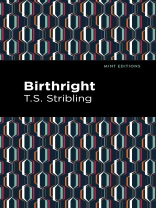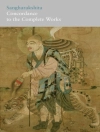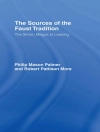Birthright (1922) is a novel by T.S. Stribling. Originally serialized in Century Magazine, the novel marked a major departure for Stribling, whose previous works had avoided serious themes altogether. Birthright was praised by black and white critics upon publication, and allowed Stribling to move his career away from genre fiction and into the pressing historical and social questions of his time. Peter is a young man with a powerful vision. After graduating from Harvard, he returns to his hometown of Hooker’s Bend, Tennessee, where he gains a new understanding of the prejudices and laws that shaped his upbringing. Born into a family of mixed racial heritage, Peter has long understood the necessity of passing, which allows him to avoid violence and to further his personal interests. Back in the South, however, he realizes that his experiences as a student have granted him an opportunity to change his community for the better. As he attempts to educate members of the local black and white communities, his hope for the future soon turns to doubt and disillusionment. Birthright, a triumphant and tragic story of race in America, was adapted by pioneering director Oscar Micheaux into a 1924 silent film and a 1939 talkie of the same name. This edition of T.S. Stribling’s Birthright is a classic of American literature reimagined for modern readers.
Since our inception in 2020, Mint Editions has kept sustainability and innovation at the forefront of our mission. Each and every Mint Edition title gets a fresh, professionally typeset manuscript and a dazzling new cover, all while maintaining the integrity of the original book.
With thousands of titles in our collection, we aim to spotlight diverse public domain works to help them find modern audiences. Mint Editions celebrates a breadth of literary works, curated from both canonical and overlooked classics from writers around the globe.
เกี่ยวกับผู้แต่ง
T.S. Stribling (1881-1965) was an American writer and lawyer. Born in Tennessee, he was raised in a family of divided loyalties—his father, Christopher Columbus Stribling, fought for the Union Army, while his mother’s family had sided with the Confederacy. In 1902, Stribling graduated from the Florence Normal School with a teaching certificate before moving to Tuscaloosa, Alabama to work as a teacher. In 1905, having abandoned his teaching career, he graduated with a law degree from the University of Alabama. Despite earning a good job, he left within two years after his use of office supplies to write fiction was discovered. He gained a reputation as an author of adventure stories for boys, detective fiction, and science fiction tales. In 1922, he published Birthright, a novel addressing themes of race and identity in the aftermath of Reconstruction. In 1930, he published The Forge, the first novel in his lauded Vaiden Trilogy. The Store (1932), the second novel in the series, was awarded the Pulitzer Prize, and remains Stribling’s most enduring achievement. The Vaiden Trilogy, which concluded with Unfinished Cathedral (1934), is a sweeping historical study tracing three generations of the Vaiden family from Florence, Alabama. Although his novels were acclaimed by critics and such authors as William Faulkner, Stribling’s reputation—once at the forefront of the Southern Literary Renaissance—has largely faded in the decades since his death and undoubtedly deserves reassessment.












